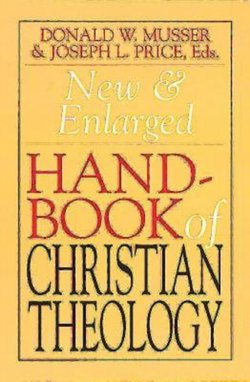Читать книгу New & Enlarged Handbook of Christian Theology - Donald W. Musser - Страница 52
На сайте Литреса книга снята с продажи.
ОглавлениеDEATH OF GOD THEOLOGY
The death of God or radical theology is really two things: a media event and a serious theological movement. The media event began unfolding in October 1965 when the New York Times and Time magazine reported on the work of three Protestant theologians: Thomas Altizer, Paul Van Buren, and William Hamilton. Although the media event lasted briefly, the radical or death of God theology was a serious scholarly inquiry that began in the Protestant tradition and eventually influenced both Jewish (cf. Richard Rubenstein, After Auschwitz) and Catholic (cf. Leslie Dewart, Eugene Fontinell, and the early Michael Novak) traditions.
In many ways the formation of the theological perspectives of Altizer and Hamilton could scarcely have been more different. Altizer was trained in the history of religions under Mircea Eliade at the University of Chicago; Hamilton was a product of Union Theological Seminary’s postwar neoorthodoxy, to the left of Karl Barth and to the right of Paul Tillich. In the work of Altizer, Hamilton, and Paul Van Buren, author of the important The Secular Meaning of the Gospel, there was a serious and continuing attempt to explore the possibility of the Christian faith and life without the reality or doctrine of God. The essays of the movement’s earliest stage can still be profitably studied in Altizer and Hamilton, Radical Theology and the Death of God (1966). Altizer’s influential Gospel of Christian Atheism and chapter 2 of Hamilton’s New Essence of Christianity (“Belief in the Time of the Death of God” [1961]) are other early sources.
Indeed, one reason that death of God theology has refused to go away, as other subjects of media events have tended to do, is that it has attached to itself a whole cultural state of affairs. Death of God is not just a parable by Nietzsche, not just an easily ignored newspaper story in mid-twentieth-century America, but a continuing cultural tradition. The death of God, for example, is at the center of the interpretations of modern drama by Martin Esslin and Eric Bentley. J. Hillis Miller similarly has offered a reading of nineteenth-century and twentieth-century poetry in the light of the disappearance and death of God in The Disappearance of God and Poets of Reality. Politics and the death of God were the shared passion of both Albert Camus in The Rebel and Michael Harrington in his remarkable essay The Politics at God’s Funeral.
In the mid-1960s, death of God theologians perceived that God was newly withdrawing from the American and European soul; this withdrawal needed historical and systematic study and begged for detective work, which is still needed. Today in each of the three great monotheistic faiths of the West—Islam, Judaism, and Christianity—God is reappearing in a variety of dangerous and evil forms. What is there, death of God theology asks, about belief in one God that makes persons and cultures evil? If it is the case that belief in but one God leads to the destruction and dehumanization of those not so believing, is it not the case that Christian justice and love require the elimination of that God as a source of evil?
In recent decades three of the most fruitful theological movements in Christianity have been black theology, feminist theology, and the theology of the East-West dialogue, which raised the vexing problem of Christian uniqueness. Death of God theology is, or should be, a presence in each of these important developments, for it raises the problem of the limits of redefinition of the idea of God. We cannot, the radicals insist, simply redefine the idea of God so that it suits our correct ideological needs, whether of color, gender, or political involvement. Historical Christianity is, probably, incurably sexist and anti-Semitic, and the theology of the death of God may help, at least slightly, in assuaging the damage done by these grievous illnesses.
A number of recent theological explorations continued the work of the death of God theologians. Altizer, always the intense and powerful Hegelian dialectician, continued to write from within the Christian tradition, insisting that Christianity is today only possible in the form of the negation of God. Altizer persistently explored the relations between death of God theology and deconstructionist literary criticism. Hamilton, less methodologically committed, worked obliquely on the idea of the death of God through literature and cultural history. Distinguishing between two kinds of death of God experience (which he calls the murderer and the detective), Hamilton devised an interpretation of Herman Melville as a significant artist of the experience of God’s death in Melville and the Sea and Reading Moby Dick and Other Essays.
Newer voices include those of Don Cupitt and Graham Shaw (see his God in Our Hands) in England, Charles Davis in Canada (see the admirable What Is Living, What Is Dead in Christianity Today), and Jens Glebe-Möller in Copenhagen (see his two essays on Christian atheism, A Political Dogmatic and Jesus and Theology). They have begun to plot the relationships among the political, liberationist, and radical theologies. Death of God theology today is neither victorious nor ubiquitous. But within Christianity it continues to explore that possible space between what used to be called belief and unbelief.
WILLIAM HAMILTON
Bibliography
Thomas J. J. Altizer, The Gospel of Christian Atheism.
Thomas J. J. Altizer and William Hamilton, Radical Theology and the Death of God.
William Hamilton, The New Essence of Christianity.
Paul Van Buren, The Secular Meaning of the Gospel.
Cross-Reference: Black Theology, Culture, Deconstructionism, Feminist Theology, Liberation Theology–Latin American, Political Theology, Silence.
DESTINY (See FREEDOM.)
DETERMINISM (See FREEDOM.)
DIALECTICAL THEOLOGY (See NEOORTHODOXY, PARADOX.)
